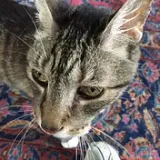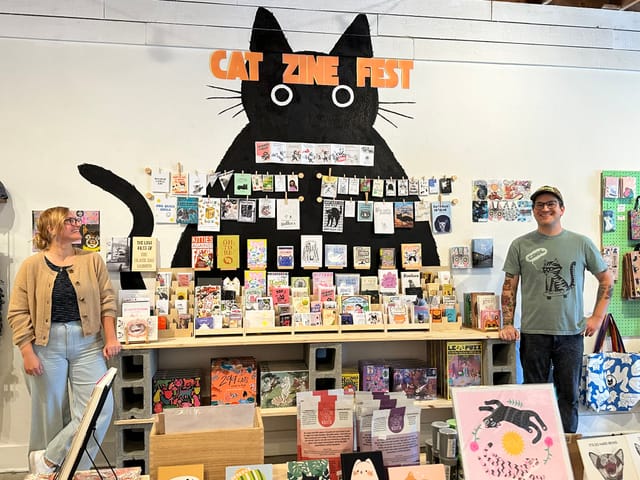Scratch This: A rabbit punch to the myth of abandoned Easter bunnies — It’s all year round
Caroline Charland stresses the importance of educating yourself about rabbits before adopting any.
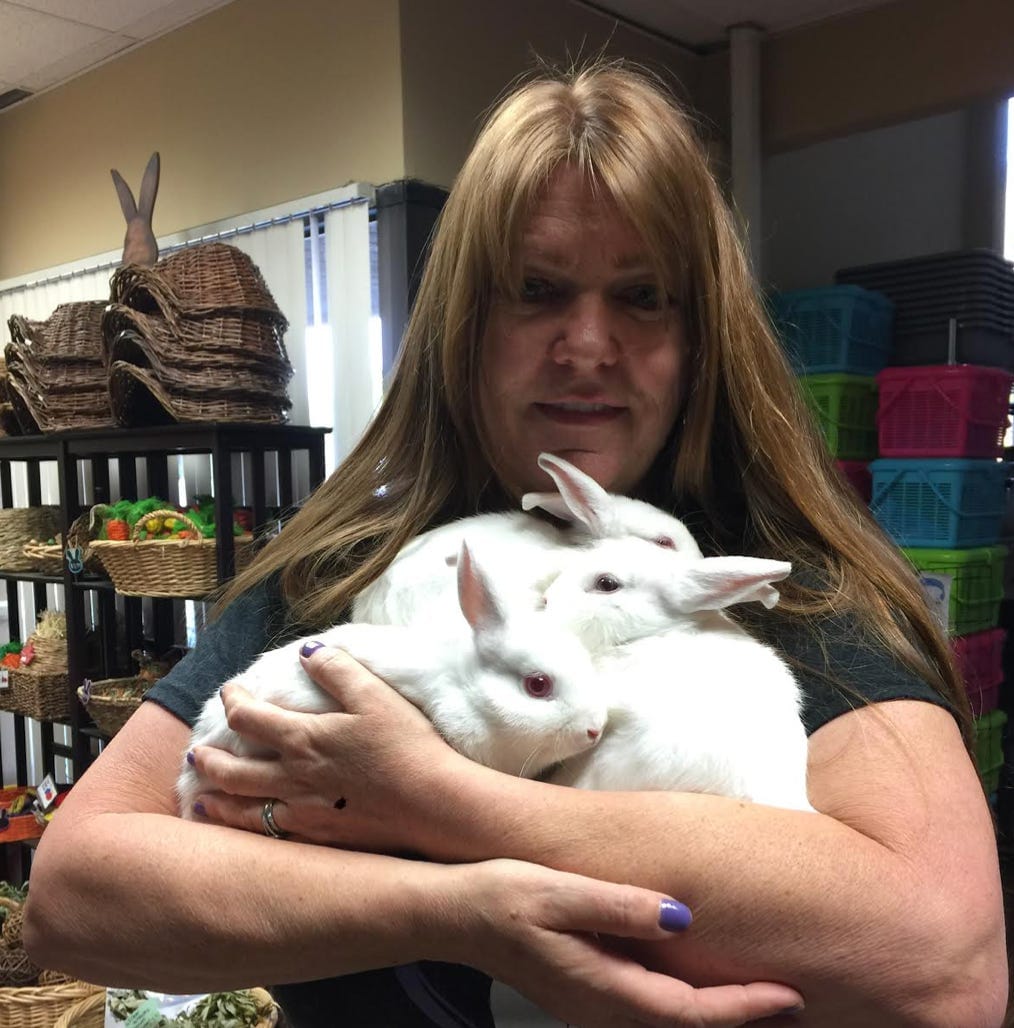
At the end of March, the pet column was in limbo between two news outlets, and I couldn’t write the post-Easter bunny-adoption article I’d planned. The idea was that during the weeks before Easter, adults adopt rabbits for their children’s Easter baskets and then give them up or abandon them — the kids get tired of them, or everyone figures out that they have to take special and sometimes costly care of the bunny, like any pet.
Well, Caroline Charland debunked the Easter bunny myth for me. Turns out that I could’ve written the article any time during the year. The well-meant but erroneous cottontale is similar to the warning against adopting black cats near Halloween — they hold as much water as a wicker Easter basket. In fact, both long-eared and pointy-eared pets and the tail waggers, too, get dumped all the time.
“It’s a huge misconception that people return rabbits after Easter — it’s all year round,” Charland said.
Charland is the founder of Bunny Bunch Rabbit Rescue, a nonprofit all-volunteer organization dedicated to saving and improving the lives of rabbits, hares, chinchillas and guinea pigs. Five years ago, she took in, rehabilitated, and adopted out three rabbits who were severely burned in a California Heights fire that killed several other pets. One, sadly, had major medical issues and died sometime later. That bunny at least experienced some human kindness during her final couple of years.
Long Beach Watchdog is a worker-owned, reader-supported publication.
As with all neglected and abused animals, it’s a lack of that same human kindness that makes rabbits suffer.
“It’s people who get rabbits from breeders, illegal or otherwise,” Charland said. “Sometimes, it’s places where they sell them for food. [Legitimate] rescues screen all adopters and do house checks. In our adoption contract, we stipulate if they can’t keep the rabbit, they must return it to us. The other places [rabbit breeders] just want the money — there’s no education on how to care for them. And they’re not spayed or neutered or vaccinated against rabbit hemorrhagic disease.”
Rabbit hemorrhagic disease (RHDV2) is a disease fatal to rabbits. A vaccine has been approved for emergency use in most of the United States, including California, and it’s thankfully shown great promise. Not spaying or neutering a bunny results in more unwanted rabbits and can cause health problems, especially in females, who have a high risk of uterine cancer. Unaltered male rabbits may be aggressive or spray the house with urine. Charland said that not altering rabbits combined with a bad diet gives a rabbit a life span of about four years. But with proper food and spay/neuter, it’s 12 to 14 years.
Veterinarians who specialize in rabbit health and spay/neuter aren’t as common as the traditional dog and cat vet, but their number has increased with the popularity of rabbits as pets. The problem with that, Charland said, is the cost of treatment, which can go into the hundreds. Low-cost rabbit vets do exist but are even less common than rabbit specialists.
‘We’re losing sleep’: 3 cars have plowed into this Wrigley area shop since last year
Caitlin Antonios • May 16, 2024
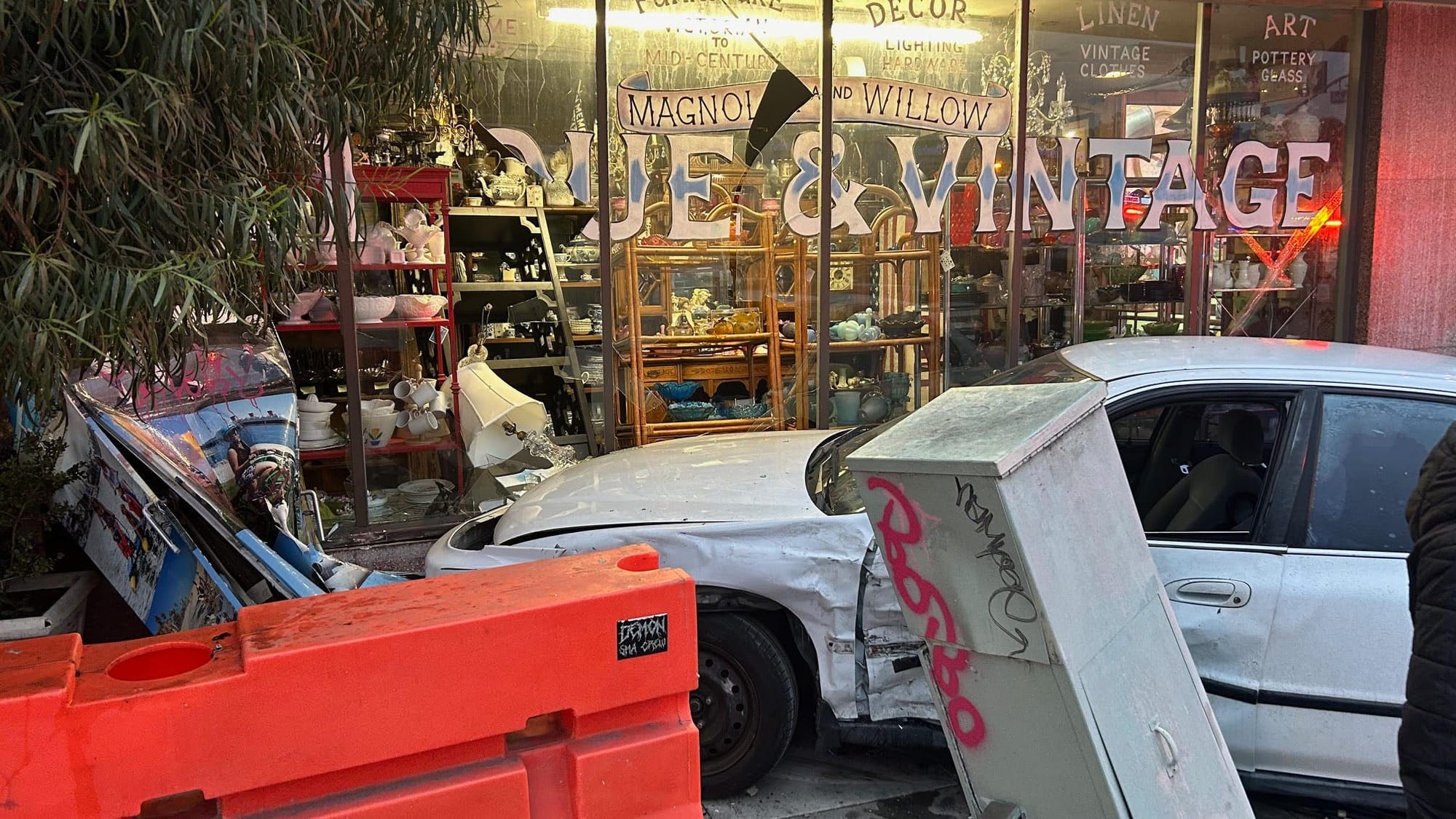
Since July 2023, Emily Yep has had trouble sleeping, wondering if the antique store she and her husband, Marshall, have dedicated the past 13 years of their lives to will be safe. At all hours of the night she jumps at any noise her store’s sensitive alarm system makes because …
Read full story →
“People don’t consider the cost of treatment — they just adopt on the spur of the moment,” Charland said. “They get them home, they spray the home, they don’t use the litterbox, they can get aggressive. I get over 100 calls a week to take in rabbits. We can’t take in 100 rabbits a week, although we do what we can. I try to give advice, and they just hang up on me or yell at me or swear at me. It’s been like this for years.”
And after the owners take the poor things to shelters or abandon them outdoors where they likely won’t survive, Charland is often there to gather them up anyway. She rescues rabbits from laboratories, takes in bunnies who were brought to a veterinarian to be euthanized, scoops them up from shut-down breeders and makes adoptable beauties out of them. City and county shelters contact her to accept rabbits — she said that she recently took 10 in from one shelter.
“People give up or abandon their rabbits because they don’t want to care for them, and that’s because they didn’t do research in the first place,” Charland said. “They get them for young children as ‘teaching tools’ as part of growing up. But rabbits aren’t tools, so after they’re given up or abandoned, they’re teaching children that pets are disposable.”
That rabbits will thrive running free in a park or a college campus with their wild cousins is another misconception, and a thoughtless one.
“Wild and domestic rabbits are completely different,” Charland said. “Pet rabbits don’t know about burrowing, so a dog or a coyote gets them. Or the heat does. Rabbits don’t sweat or pant, and they wear a fur coat all the time. It causes their brain to swell, and they die.”
Bunny Bunch does adopt rabbits to families, but the volunteers interview them to see the level of responsibility they’ll take and if they’re knowledgeable about rabbit care. If they’re not, no problem — Charland will personally instruct them using her cottontail curriculum. Bunny Bunch’s website also provides information and articles about rabbit care.
Charland is planning a YouTube channel, “Rabbit Time with Caroline,” and in June, you’ll be able to take free rabbit-education classes. To sign up, contact Caroline@bunnybunch.org. Both the channel and the classes will offer such topics as basic care, grooming and bunny bonding, which involves successfully introducing rabbits to each other. Charland is a pioneer in this art.
“We had so many to rescue, and we had to!” she said.
Charland learned rabbit care from scratch, so to speak. Growing up in New Milton, a town in Hampshire, England, she cared for her horses, guinea pigs and cats, but no rabbits. She moved to California as an adult, and had her first experience with a bunny 40 years ago, in Whittier.
“I went to a pet shop to get cat food and saw a rabbit in a tiny, filthy cage, with no food or water,” Charland remembered. “So, I went up to a counter where there was a guy, ironically, eating a massive meal, and I said to him, the rabbit has no food or water, and the guy said, when I’m finished with lunch, I’ll get something. I called my husband and told him I was bringing a rabbit home.”
That was the beginning of what’s likely the first rabbit rescue in California.
“I learned as I went along,” Charland said. “I wrote articles and mailed them everywhere. I made posters and talked to vets who wanted to learn about rabbits. It’s a passion!”
Bunny Bunch’s services multiplied like — well, you know what, if they’re not fixed. The nonprofit is now celebrating its 40th anniversary. The two locations, one in Fountain Valley and the other in Montclair, offer bonding services, paid consultations and a boarding at their “hotel and spa,” The Cottontail Inn. The Bunny Boutique sells goodies like hay, organic toys that look too charming to chew, and handmade treats crafted from plants in Charland’s garden.
In the classic children’s story, “The Velveteen Rabbit” by Margery Williams, the title character, all scruffy and worn out with the love of a child, has a passionate desire to become real. He asks the Skin Horse, another toy who’s the worse for the wear because of love, whether it hurts to be real.
“’Sometimes,’ said the Skin Horse, for he was always truthful. ‘When you are Real you don't mind being hurt.’”
Beautiful story, but the Skin Horse spent too much time in the nursery and had it wrong. It hurts to be real for a lot of creatures. But at least for rabbits, Caroline Charland and the volunteers at Bunny Bunch have eased the pain and told other bunny parents how to do it themselves.
Yours drooly
The Bunny Bunch has some good buns to wiggle your nose at, and they have adoptable guinea pigs and chinchillas, too! If you’re ready to adopt and want to jump down the information rabbit hole, visit the Bunny Bunch’s website, check out the adoptables, and complete an online application. Before you hare off to the next section, here are some wavishing wabbits! Adopting two of them makes for guaranteed happiness for all.
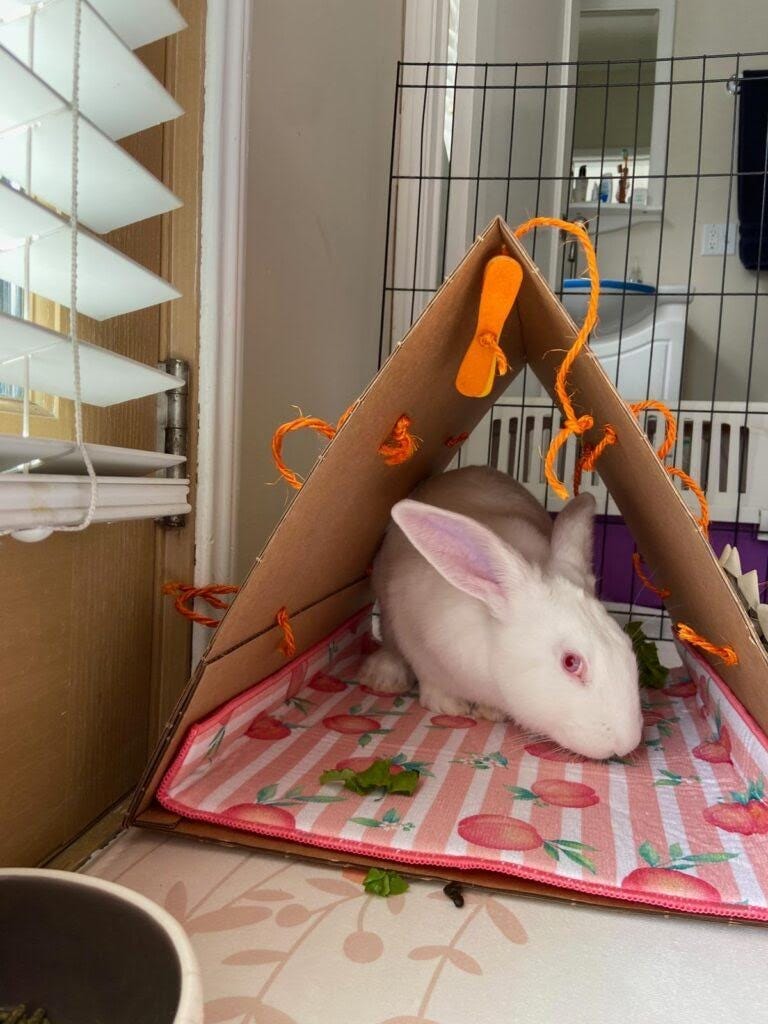
Meet Pax, a gorgeous New Zealand bunny who is super-friendly and sweet. He was rescued from a lab with nine other bunnies. He has such a wonderful personality! Pax is a joyful boy who loves to binky [for the unbunnified, it’s a rabbit happy dance involving a jump] and do zoomies [like when the cat suddenly goes all pupil in the eyes and dashes around the house]. While at his foster home, he loved to get on the couch and on his foster lap for cuddles. He loves pets and attention and will race over to say hello when people walk by. This amazing bunny deserves a wonderful forever home of his own.
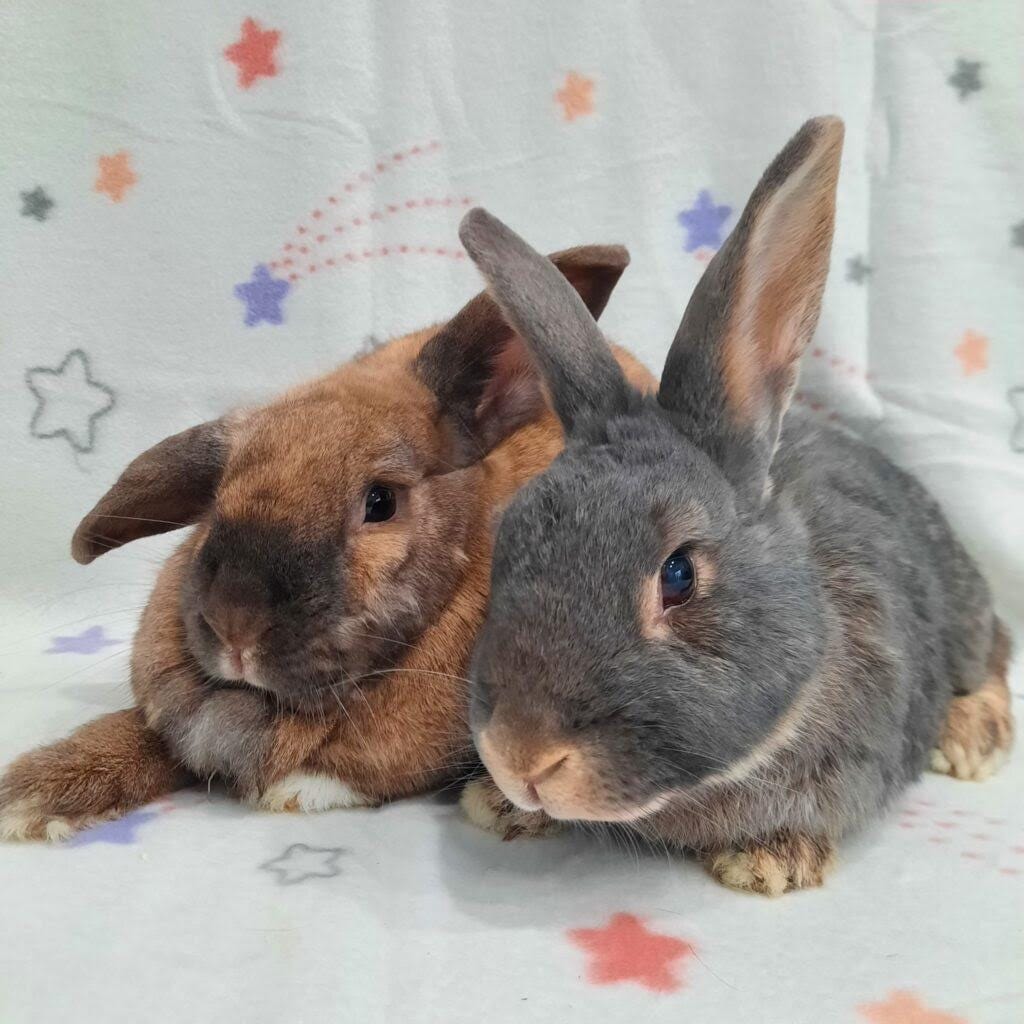
Pumpkin, the brown/orange male bunny, and his companion, adorable gray-lady Willow, are super in love and care for each other deeply. This senior pair had a loving home, but their owner passed away. They’re sweet and mellow and enjoy cuddling together and the companionship of people they trust. This precious couple is looking to find their forever retirement home. If you can’t resist such a lovely couple, you can fill out an adoption application online.
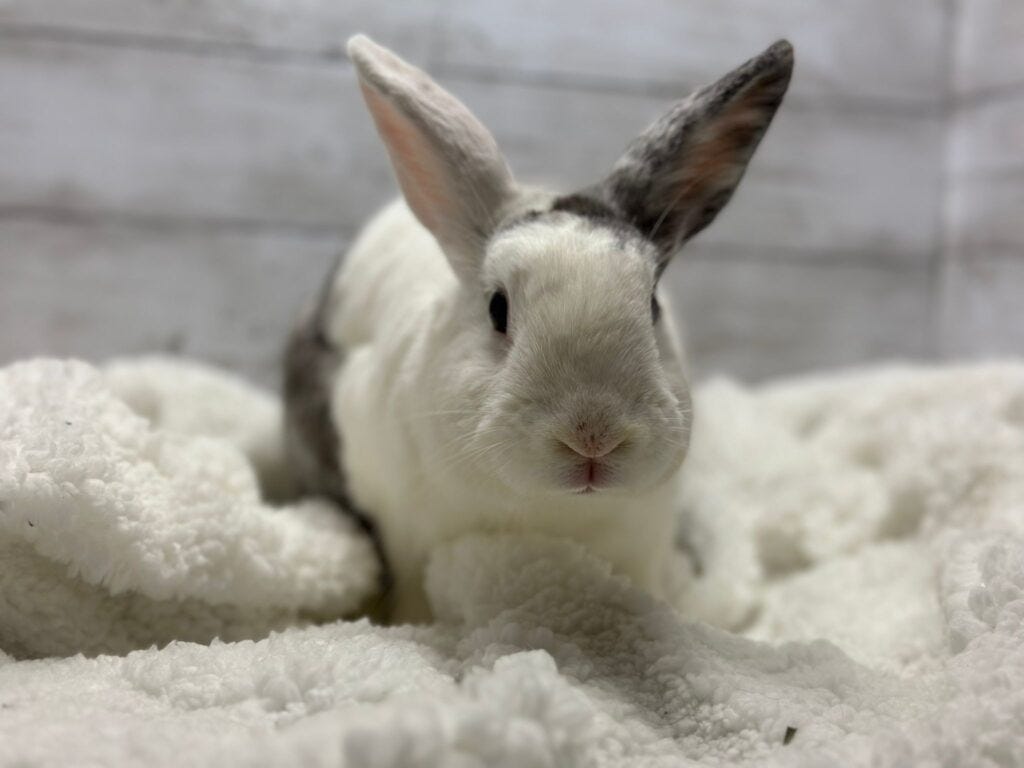
TikTok, a sweet harlequin mix, was originally found abandoned in a shopping cart with eight other bunnies. All the other buns have found their forever homes except TikTok. He’s very friendly and loving. It’s comical to see him lounging with his feet kicked out! TikTok loves attention, although he can be a little reserved at first. But once he feels safe with someone, he loves getting pets. His foster said that if she sits on the floor to spend time with him and doesn't start petting him right away, he’ll start licking her leg. He is a playful, happy bunny.
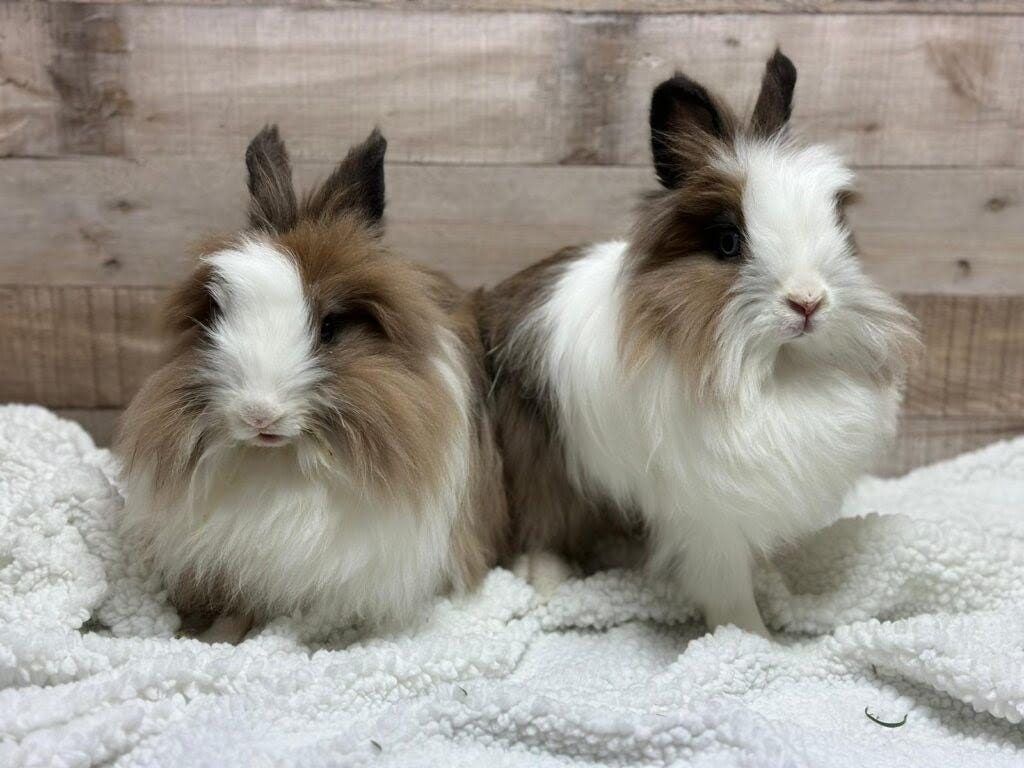
This fluffy duo consists of Tinkerbell and Blue Bear. Both of these cuties were left abandoned in a house in Pomona, along with eight other rabbits. They’re amazing and sweet and deserve a home of their own. Blue Bear has one striking blue eye, making her unique but just as beautiful as Tinkerbell. Anyone would be lucky to have them!
Tail-wagging and nose-booping things to do
Shell out some love on World Turtle Day, May 23
Naturally, we’re following rabbits with turtles, and the race ties for first place, as devotees of either species will tell you. World Turtle Day® (the holiday’s trademarked, and the creators want people to use that little eye-poking mark of registration) is a national observance brought into being by wife and husband Susan Tellem and Marshall Thompson, who founded American Tortoise Rescue in Malibu. If you live with a turtle, shellebrate (pun attributable to Tellem and Thomson) them with a few of the activities they present. Locally, plod over to the meetings of the Long Beach chapter of the California Turtle and Tortoise Club to learn about these wonderful reptiles. Enjoy life like a turtle—slow down and smell the mealworms.
The Long Beach chapter of the California Turtle and Tortoise Club meets at 7:30 p.m. on the third Saturday of each month at St. Gregory's Episcopal Church, 6201 East Willow Street, Long Beach.
Low-cost vaccination clinic at Long Beach Animal Care Services
The cost of medical care for pets can be a deterrent for people struggling to pay household bills. Because pets are family members, Long Beach Animal Care Services and CAMP (Community Animal Medicine Project) are knocking down the price barriers. CAMP’s mobile clinic will drive into the LBACS lot on May 24 to offer low-cost vaccines — shots, prices and information about other clinics available here. Bring past vaccine records, and keep your dog leashed and your cat in a carrier. No appointment necessary, but get there early because the clinic is open to the first 60 patients.
The low-cost clinic takes place Friday, May 24, 10 a.m.–3 p.m. at Long Beach Animal Care Services lot, 7700 E. Spring St., Long Beach, at entrance to El Dorado Park. No parking fee for shelter guests.
Enter your pet in the Face of Fog City photo contest
Your pet can be the face of Pet Food Express’ new brand, Fog City Pet! Fog City was named for Pet Food Express’ Bay Area origin and is an exclusive brand based on sustainability and reducing waste. Fog City Pet features durable pet bowls, beds with 100% recyclable filling, plant-based shampoos, and limited-ingredient treats for dogs and cats. To enter your pet, boot up your Instagram or set up an account, follow Pet Food Express, upload a photo of your pet and tell why they should be the face of Fog City Pet. Tag @PetFoodExpress and use #FaceofFogCityPet in the caption, and Bingo was his name! Your best buddy has a chance of being crowned the Face of Fog City Pet!
Entries accepted through May 26. The grand prize winner gets a professional photoshoot of their pet, a year’s supply of Fog City Pet goodies, and a $500 Pet Food Express gift card. The new Face will be featured in Fog City Pet’s marketing on social media, their website, and digital advertising. Five second-place winners receive a $250 Pet Food Express gift card. Photo entries will be reviewed and voted on by a panel of Pet Food Express employees. Winners will be chosen June 3 and notified through Instagram direct message. Further information here.
Need a low-cost veterinarian, information about trapping community cats, places to volunteer—anything pet-related? Follow this link for resources. Please add your own ideas in the Comments section.
Kate Karp has covered animal care and pets in Long Beach for almost two decades. Her new column, Scratch This, will be published in the Long Beach Watchdog every week.
We need your support.
Subcribe to the Watchdog today.
The Long Beach Watchdog is owned by journalists, and paid for by readers like you. If independent, local reporting like the story you just read is important to you, support our work by becoming a subscriber.

